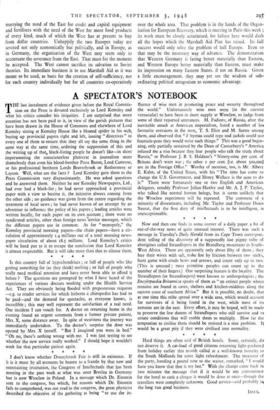I don't know whether Donnybrook Fair is still in existence.
If it is it must by all accounts be beaten to a frazzle by that new and entertaining institution, the Congress of Intellectuals that has been meeting in the past week at what was once Breslau in Germany but is now Wroclaw in Poland. In a message which Dr. Einstein sent to the congress, but which, for reasons which Dr. Einstein fails to comprehend, was not read to the congress, the great physicist described the objective of the gathering as being "to use the in- fluence of wise men in promoting peace and security throughout the world." Unfortunately wise men seem (in the current vernacular) to have been in short supply at Wroclaw, to judge from some of their reported utterances. M. Fadieev, of Russia, after the inevitable smack at American imperialism, listed a number of his favourite aversions in the west, T. S. Eliot and M. Sartre among them, and observed that "if hyenas could type and jackals could use fountain-pens they would write such things." This was a good begin- ning, only partially sustained by the Dean of Canterbury's "America refused me a visa because they fear people who talk the truth about' Russia," or Professor J. B. S. Haldane's "Ninety-nine per cent. of Britons don't want war ; the other I per cent. [i.e. about 500,000] are in the Foreign Office." Worthy of mention, too, is Mr. Albert E. Kahn, of the United States, with his "The time has come to change the U.S. Government, and Henry Wallace is the man to do it." There were fortunately one or two English and American delegates, notably Professor Julian Huxley and Mr. A. J. P. Taylor, who talked like normal human beings, but it seems unlikely that the Wroclaw experiment will be repeated. The comment of a minority of dissentients, including Mr. Taylor and Professor Denis Saurat, that the first duty of intellectuals is to be intelligent, is unexceptionable.


































 Previous page
Previous page